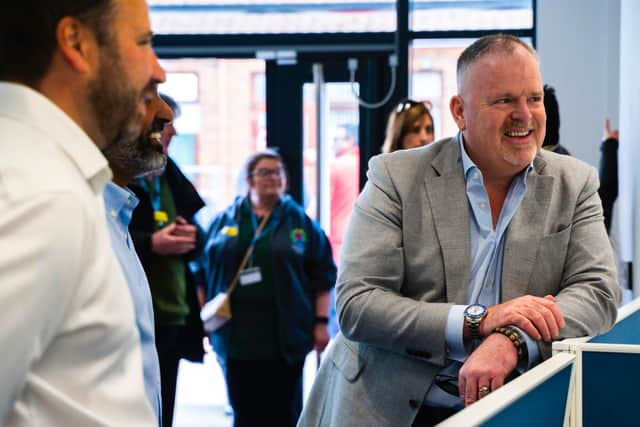How Neil Armstrong aims to turn United Living Group into a force for good
A serial entrepreneur at heart, Neil Armstrong realised that rather than making money for others, he needed to make it for himself.
And so, in 2005, following senior executive roles at major construction companies including Alfred McAlpine, he acquired Fastflow Pipeline Services from Northumbrian Water.
Advertisement
Hide AdAdvertisement
Hide AdNeil explains: “I came from a background of Irish builders and skilled labourers and so it’s no surprise that I entered the industry as construction ran in the family. Although I wasn’t particularly well educated, I soon found my niche and started to excel in various project and contract management roles which I enjoyed very much.”


He continues: “However, I suddenly realised that whilst I thrived in all my various roles, at the end of the day I’d been making money for other people for years – why not make money for myself? I saw an opportunity to purchase Fastflow Pipeline Services from Northumbrian Water and decided to seize it. When it hit me that after working for others for so many years, the buck finally stopped with me, it was quite a scary thought!
“I was 35 years old with a house to run and had suddenly given up an extremely promising career with Alfred McAlpine to pursue what was then just a dream.”
But for the inspirational businessman, it was certainly the right move to make and led to him realising his dream.
Advertisement
Hide AdAdvertisement
Hide AdAn experienced business leader and entrepreneur, who thrives on working in high-growth environments to deliver value enhancing strategic change and shareholder returns, Neil set about growing Fastflow, through organic growth and targeted acquisitions, into an organisation with revenues more than £130m.
In 2014 Fastflow, originally a North East pipeline specialist, moved into building maintenance with the takeover of Oxford property maintenance and refurbishment business DW Contractors; and later acquired affordable housing developer Partner Group.
But Fastflow’s major expansion into the property market came in 2019 when it merged with United Living – a provider of new and refurbished homes for clients throughout the UK – to create the United Living Group with a combined turnover of about £400m and Neil at its helm.
The group now trades through three main operating pillars: United Living Infrastructure Services (ULIS), United Living New Homes (ULNH) and United Living Property Services (ULPS), which collectively deliver a broad range of integrated support services. Many clients are housing associations and housing developers who in turn have been contracted by local authorities to tackle some of the most pressing environmental and social concerns from reducing avoidable waste to reducing carbon emissions by 2030.
Advertisement
Hide AdAdvertisement
Hide AdNeil explains United Living Group’s ethos: “Our purpose is to help create sustainable places that enhance the communities in which we live, learn, work and play. We’re already on a journey, and have been for years as a responsible business, with sustainable priorities.
“We’re supporting our clients on their decarbonisation journey as well as setting our own net zero carbon and sustainability objectives. We’ve implemented a range of measures that prioritise sustainability, including commitments to reduce carbon emissions to Net Zero by 2030, two decades ahead of the UK government’s existing target of Net Zero by 2050.
“Other measures include reducing avoidable waste to zero in the development process of all United Living Homes, as well as eliminating the use of single-use plastics by the same timeframe.”
The company is currently involved in several large-scale projects across the Yorkshire region. Last year, it was awarded a major contract by The Guinness Partnership to deliver new homes at its Points Cross development in Leeds. United Living will deliver 311 residential apartments, which will be 100 per cent affordable (shared ownership and affordable rent). The scheme forms part of a major regeneration programme of the South Bank area of the city, which will provide more than 8,000 new homes – 928 of them at Points Cross. United Living New Homes is also working in close partnership with The Leeds College of Building, University Technical College Leeds, and The Ruth Gorse Academy, to support apprentices and work placements during the construction, which is scheduled to be completed by spring 2023.
Advertisement
Hide AdAdvertisement
Hide AdNeil says: “This contract award is an exciting addition to our growing portfolio of development projects. Our values are to ensure we help our clients create great places, where people enjoy living and provide the essential services that support daily life. So, we were delighted when asked to support the delivery of this development project on behalf of The Guinness Partnership.
“Leeds is a thriving growing city and needs new, good quality housing to meet demand. We’re pleased to be playing a leading role in the regeneration of this area of the city and creating much-needed new homes for residents.”
And so, what does the future hold for the United Living Group?
With a current turnover of £600m, Neil has set his sights on growing the business organically to £1bn within five years.
Advertisement
Hide AdAdvertisement
Hide AdHe concludes: “We possess people with a shared ethic and common purpose, who deliver a best-in-class service. People who take their responsibilities to clients, residents, employees, the environment, and communities in which they work very seriously”